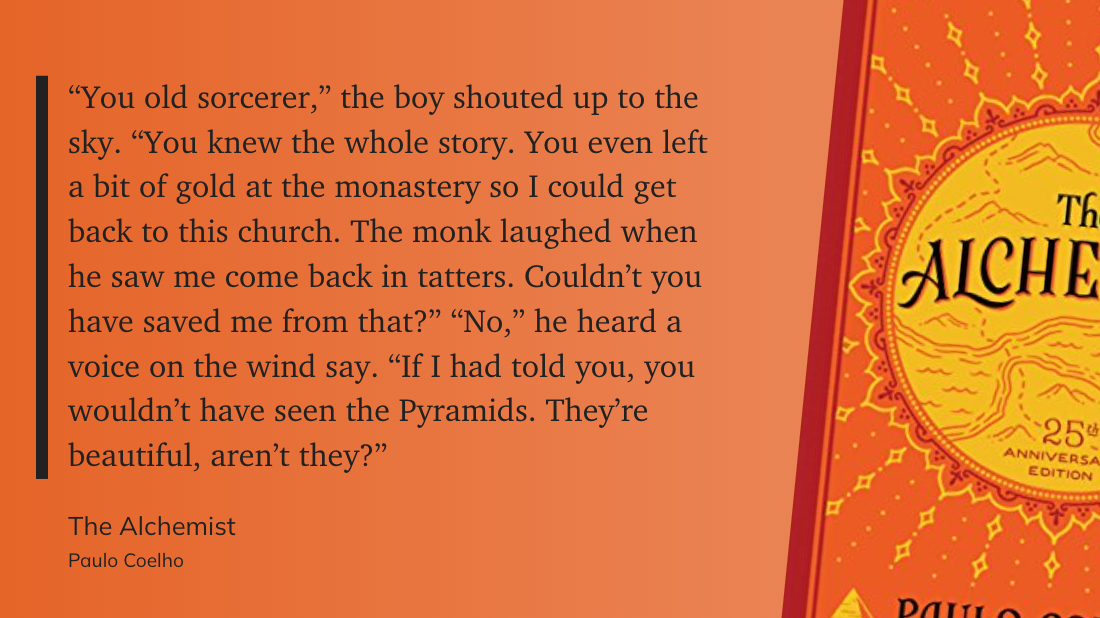I ran the Tokyo Marathon 2024. I did it in 2:53:44. It was my sixth world marathon major so I got an extra medal for my efforts. Sweet !
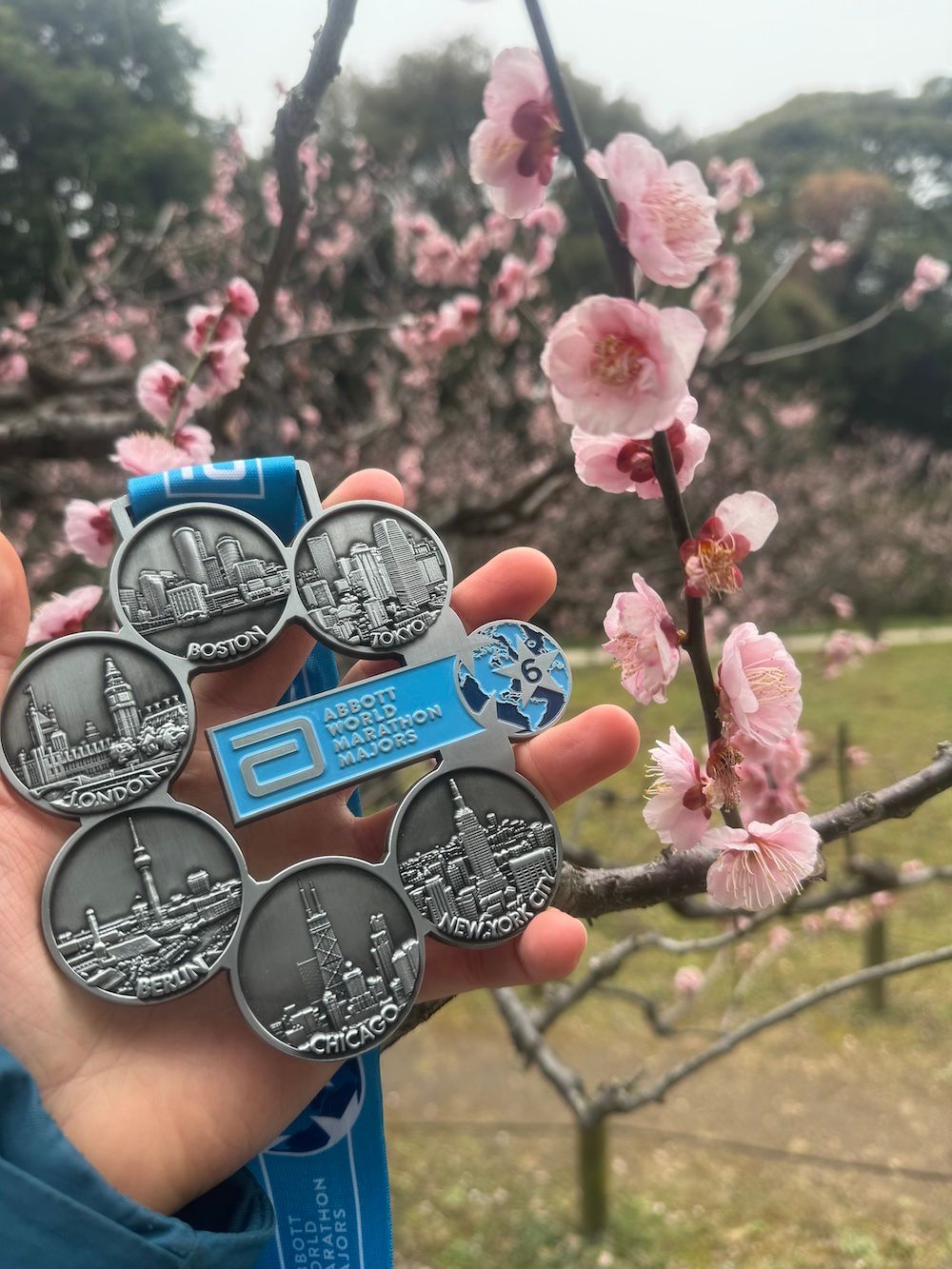
When considering how to write about Tokyo I spent a lot of time thinking about my last year of racing, and my experiences completing the five other major marathons. It dawned on me why having a blog has been so useful to me - an indexed, searchable log of my life. I don't need to think about how I felt or what I did in the build up, I can read it from my own perspective.
You can too:
- Race Report: Berlin Marathon 2016 - 2:52:06
- Race Report: Boston Marathon 2018 - 2:58:18
- Race Report: London Marathon 2019 - 2:54:50
- Chicago Marathon 2022 - 2:59:56
- New York City Marathon 2023 - 2:47:34
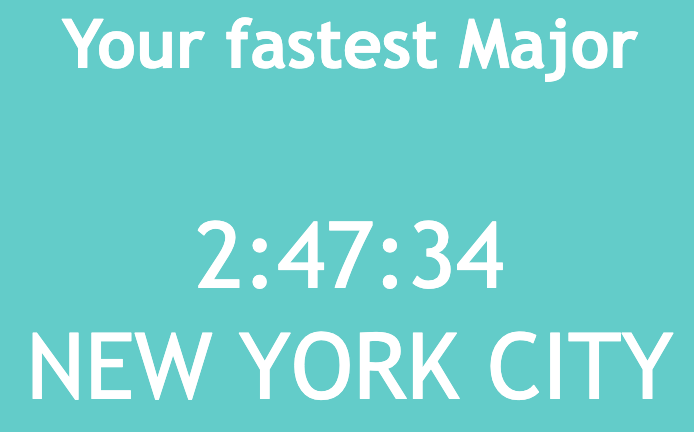
Value
The true value of Tokyo was that it made me stop for a moment, step back, and appreciate my past successes. I have always pushed myself further and further, moving the goal posts as I have progressed forward. There was never an opportunity to 'win' because I would just think of something longer, harder, or stupider to target next. Any suggestion that I could not do something, or that my goal was too lofty would just motivate me to work harder and fortunately most of the time I was able to execute.
I have always lived by the adage that 'how you do anything is how you do everything', and the way that I did anything was always 'do it properly or not at all'. I stand by that. Over the course of the 8 years that it has taken me to complete the majors my positioning on the approach has yo-yo'd but I sit here today and think that (especially in the context of endurance running) the real value comes from setting a goal, and going after it all or nothing. It is never easy, but it is always worth it.
And whilst I have a good track record, the reality is that I have 'failed' multiple times along the way. It always hurt in the moment, but you dust yourself off, pick yourself up and try again. I guess it is one of those areas of life where the brain inherently biases towards the positive. In my instinctual mind the road to completing the majors was success after success, yet in reality it was nothing of the sorts.
Training
So.. at the end of 2023 and the start of 2024 I was battling all of the diseases. It felt like I perpetually had some sort of flu like illness. I was constantly exhausted, felt run down, and my Garmin kept on telling me that my HRV was low and that I was falling apart.

I had planned post NYC to take a month or so off and then gradually build back into it at the end of December. The reality was that the date just kept getting pushed back and when I still wasn't feeling ready to start training two weeks into January I kind of just gave up on doing anything other than 'just' sub-3 in Tokyo. But then I felt better.. it really was that sudden. One day I kind of just woke up and felt much better. I started training.
My training was very much focussed on quality over quantity. It was basically two track sessions (Tue/Fri), parkrun on Saturday, and a Long Run. The premise was training under fatigue, and then cross training (mainly yoga). It worked incredibly well for 6 weeks. Whilst track sessions are mentally always super tough I was getting through them, and getting faster. I even completed Yasso 800s one week, a session which I have only ever managed once before.
It's totally understandable as to why, but the long runs were improving less dramatically and I was very cognisant of the fact that I was not performing anywhere close to how I had pre-Manchester. It seemed like I was getting faster but my endurance was not improving. I did my long runs with the Brekkie club boys, and the general premise was longish runs with marathon pace miles in the middle. I could always hit the paces, but not for the distance.
In mid February my body battering approach to training caught up to me and I sustained a knee niggle injury. I am aware (from historical trial and error) that many a running injury can be managed and run through but this one felt a little different. I rested (a little), and it felt like it was improving. I then did a track session (which went incredibly well) but the knee flared up again. I rested more and then decided to see where my fitness/injury was at by.. running a race.
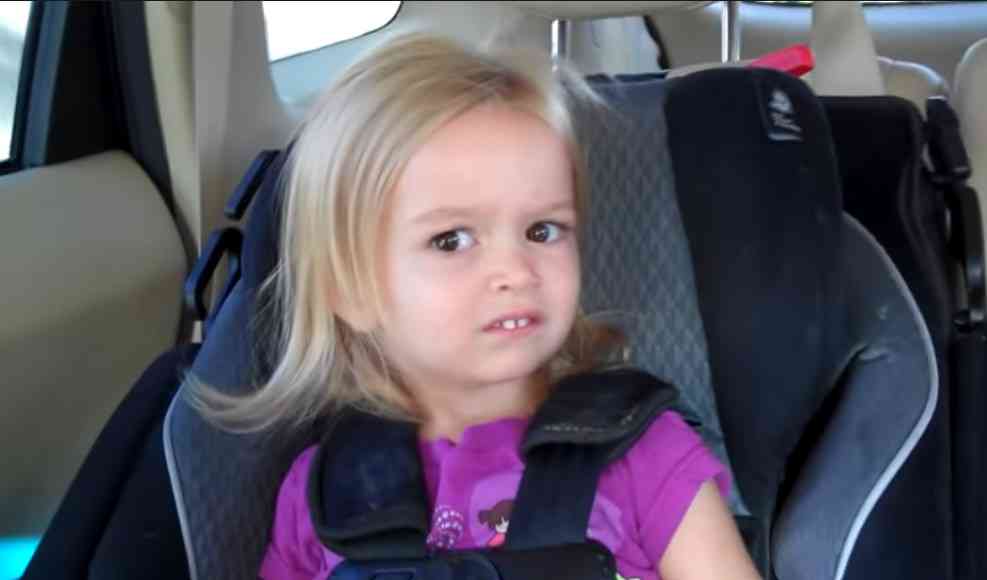
I don't really like racing at the best of times but a free race entry meant that I decided to do the Village Bakery Half even though realistically I probably shouldn't have. Whilst my knee was (as anticipated) an issue, the reality was simply that I did not have the fitness that I thought I had. I ran a 1:20:12 but was fairly disappointed with that - it felt much harder than I had anticipated.
At this point I opted to kill the training and go into a two week total taper whereby I did absolutely no running. I did a single week total taper pre Manchester and it worked remarkably well. I figured that it was more important to actually get around the race noting that these kind of injuries progress to race ending pains if not managed.
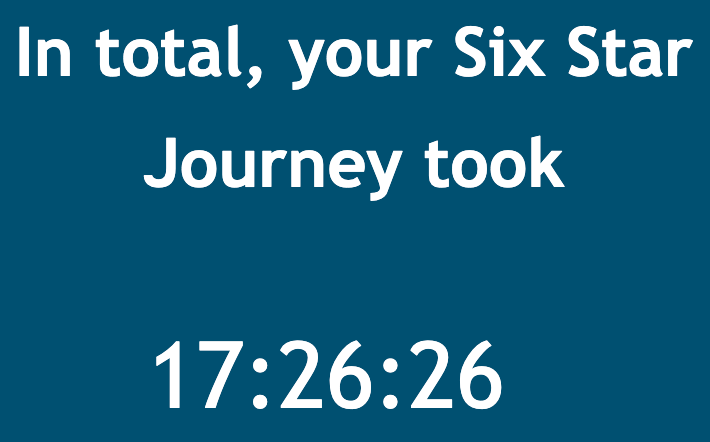
On the Saturday before the race I did Hikarigaoka parkrun (obviously). I had rested the knee and I had been walking ridiculous daily distances (90 miles in the 7 days pre-Tokyo) without issue so figured that it would probably be OK. My intention (knowing that I was not going to race Tokyo) was that if the field wasn't too competitive I would try and get my first international parkrun first place finish. The knee hurt, but I warmed up into it. Again, the bigger issue was that my fitness just wasn't there. I felt like I was having a heart attack at a pace that previously would have been easy. It was not ideal pre-race from a mental point of view but I was very aware that at this point it didn't matter..
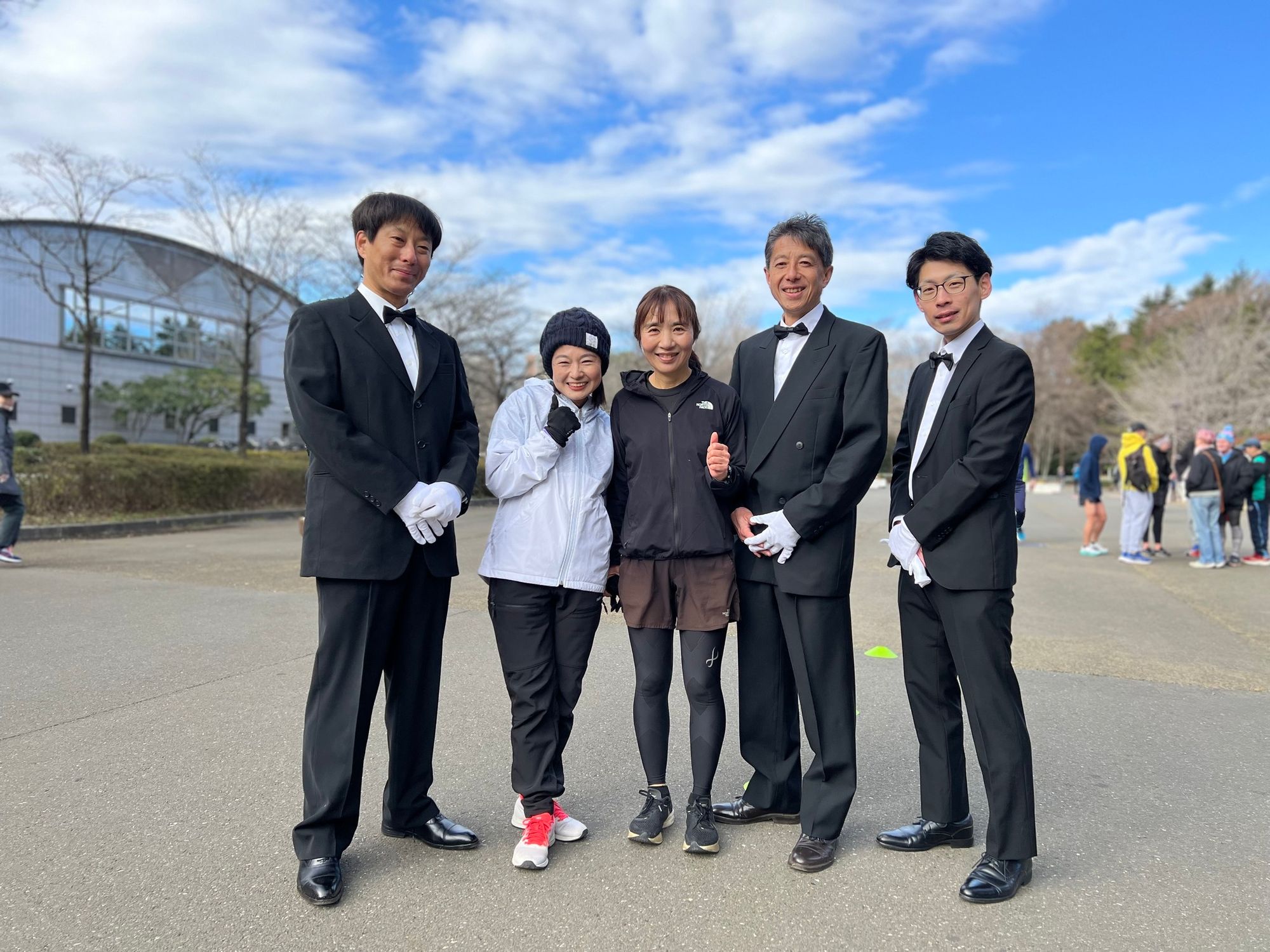
Race
The world works in funny ways. Given that I didn't have the pressure of trying to PB I slept really well. This never happens. I then went to the start line and bumped into Jimmy who I had met in New York. In a crowd of 30,000 people.. He was also injured and wanted to run a sub-3 - we agreed to run together. This was exactly the mental boost that I needed. I am genuinely unsure if I would have run what I ran had I not had Jimmy as a pacing accountability buddy.
For the first six miles we were stuck behind a 3 hour pacer that had gone out too fast. We were conversationally running 6:30s with regular injury check-ins that basically amounted to "You good?", "I'm good". Jimmy pointed out that I was quite clearly limping at pace which wasn't particularly reassuring but I knew that if the pain stayed at the level it was at I would be good.
Eventually we passed the sub-3 pacer. We continued on to halfway in around 1:28. I was aware the pace wasn't just sub-3 but I wanted to bank time. When we passed half way I was slightly concerned because I thought we had banked more time. At mile 15 my left quad was screaming in pain - I'm pretty sure I was overcompensating on my left hand side and that my left quad was basically powering my run. Noting my Comrades down run experience I was aware that I could run in excruciating pain but ideally some deep heat would be part of the equation. There was a deep heat (equivalent) point on the course and it seemed like a blessing at the perfect time. Sadly it was a 'go 500m down this path, fill in a form, and get some deep heat' kind of affair and I really did not have the time. I ran past thinking that that could be the make or break decision.
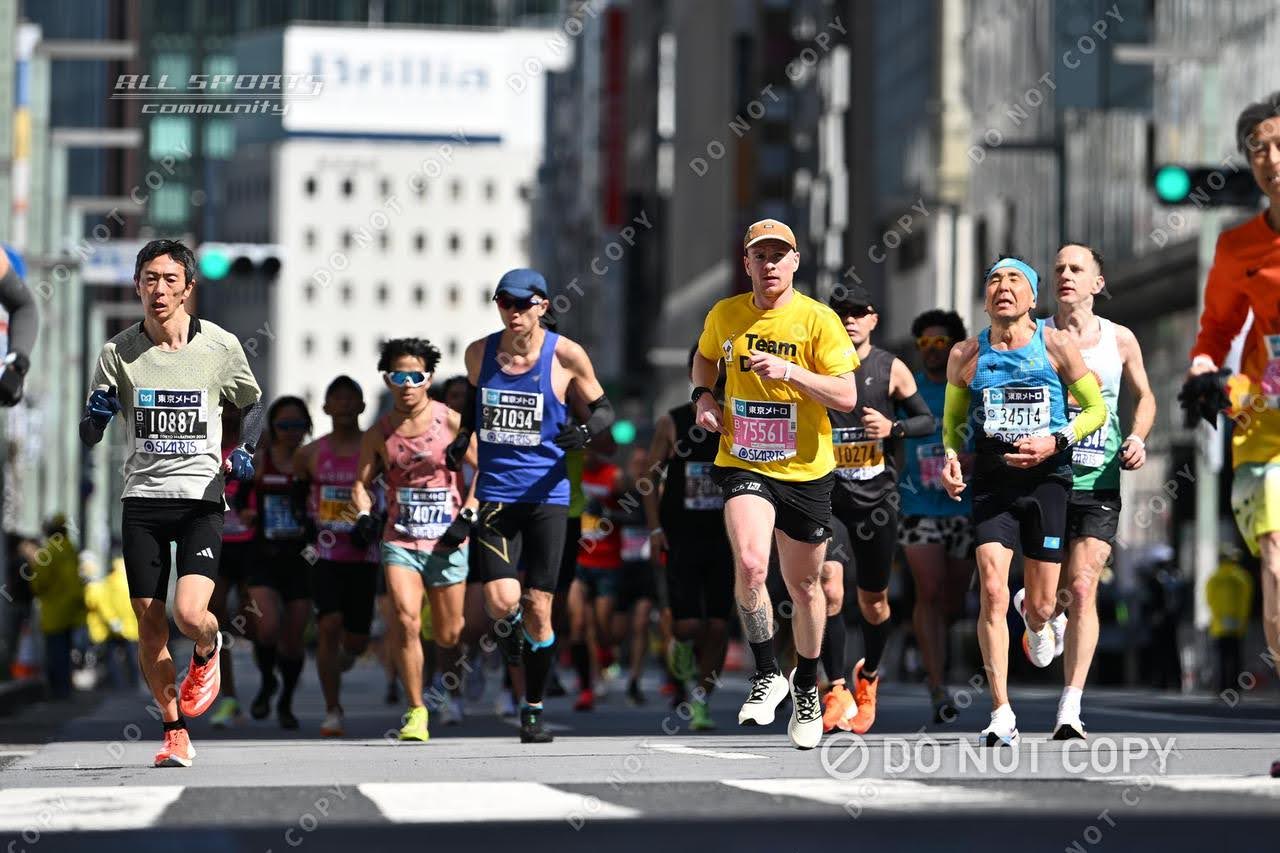
In Chicago I fell apart at about mile 17. That was a physical wall - I was out of energy. This time the wall was earlier but it was a pain wall. I had looked back and Jimmy was nowhere in sight (it turned out he had cramped up and had to stop. He did finish (in 2:58)). I was in excruciating pain and running solo but support from Moritz at the right time really pushed me back into the zone. I begun ticking off the miles. At 17, it became '3 parkruns to go'. The out and back sections were mentally rough simply because of the length of the 'out' part. The heat was getting to me, but fortunately I had been drinking and pouring water over my head at basically every aid station (I learned from Roth too). I had no capacity to try out to fun and unique foods (Doll shaped pancake??) at the various aid stations, and there was no capacity for truly appreciating the quiet but present Japanese support. It was metronome mode.
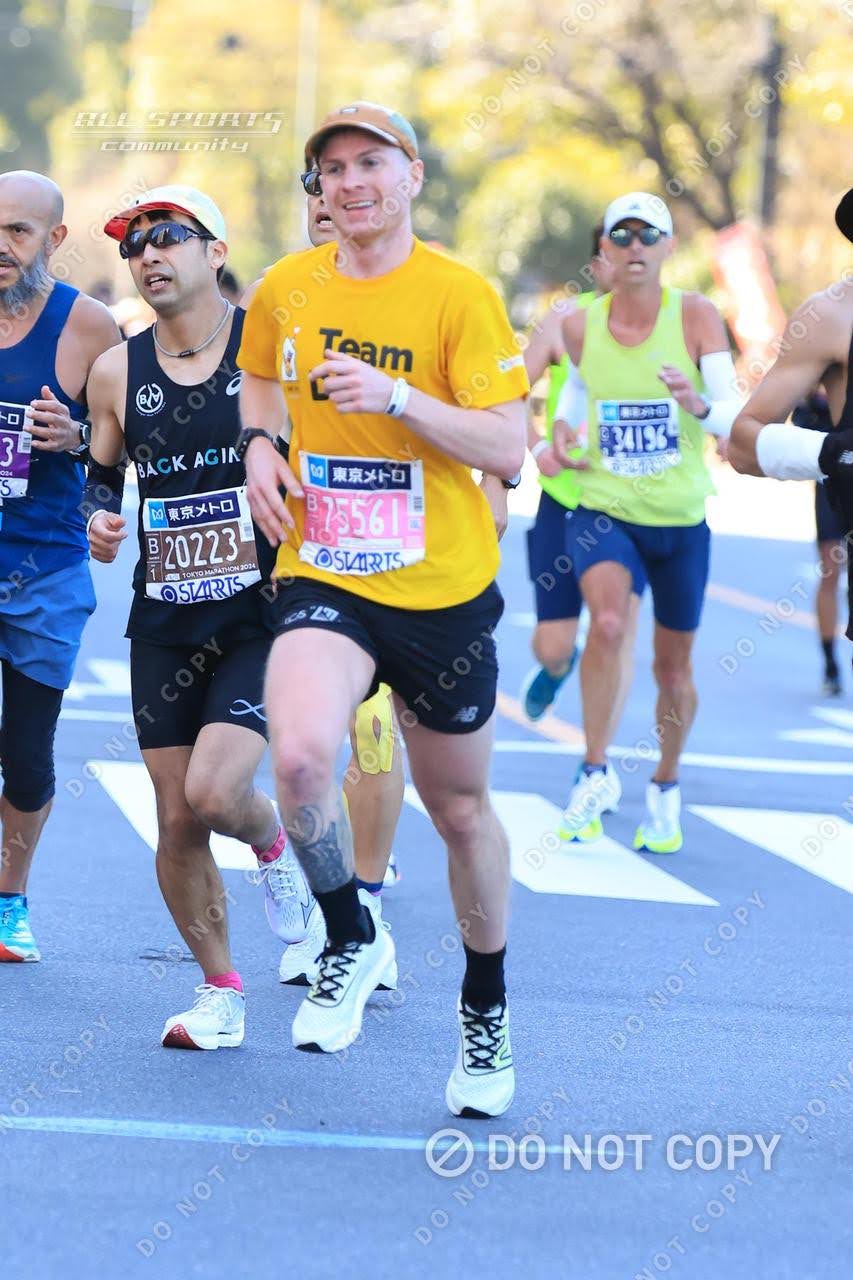
Looking at the Tokyo photos is an interesting one. Normally I just look terrible in photos and they aptly portray the effort and duress that my body is under. The Tokyo photos are actually really good (in my opinion) - they make it look like this wasn't the hardest major for me physically.
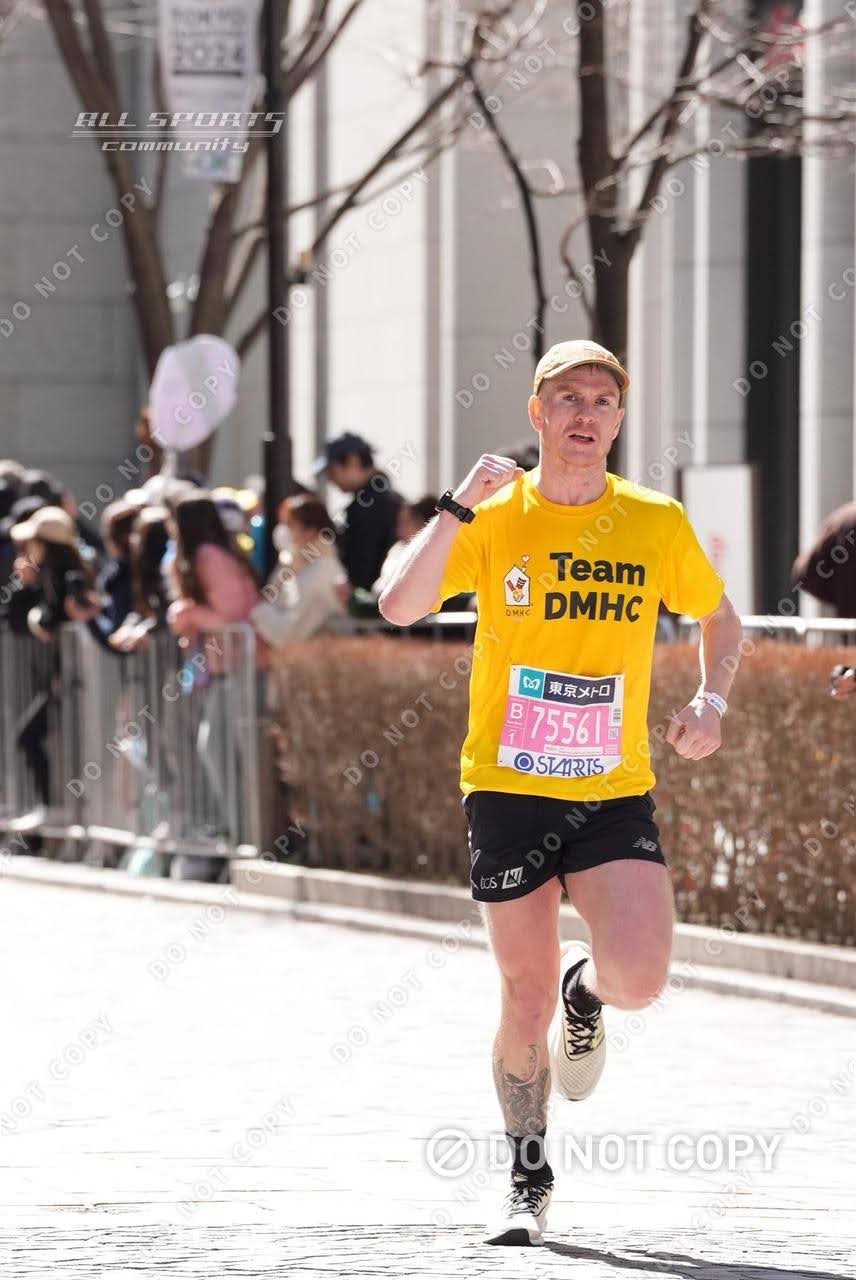
I think when all is said and done the incredible Jasmin Paris says it best: "I was just telling myself if you don't finish it now, you'll have to do it again".
Charity
In a lot of the Tokyo photos the yellow 'Team DMHC' shirt is very visible. This is the shirt that was given out by Donald Mcdonald House Charities Japan - the charity that both my brother and I ran for.
Now lets be real. We both ran for charity because Tokyo is an incredibly hard marathon to get into. That said, I did at least take the time to read through the list of charities that were offering places such that I could run for one that resonated with my personal values. RMDH offer accommodation for children undergoing serious medical treatment and their families. I can only imagine how sucky it would be to have a seriously ill child and not be able to be with them in a comfortable environment due to financial constraint. The charity is also internationally recognisable and I have historically been aware of their British and US operations.
When they offered us the opportunity to go and look around and see what they did first hand we both jumped on the opportunity. It was awesome ! The volunteers that run the house that we visited at Tokyo University were just so incredibly kind and welcoming. They showed us around the house, explained in-depth what they did, explained how the charity is called 'Donald Mcdonald' in Japan because the Japanese do not have an 'R' sound, and gave us goody bags :) They then supported us on the course too ! At the after party they came and took photos with us, and welcomed us back in the future.
I don't know.. this bit is kind of a ramble. I think my point is that this was an incredibly wholesome and important part of my Tokyo experience, and if you ever get the opportunity to support them in what they do.. please do.
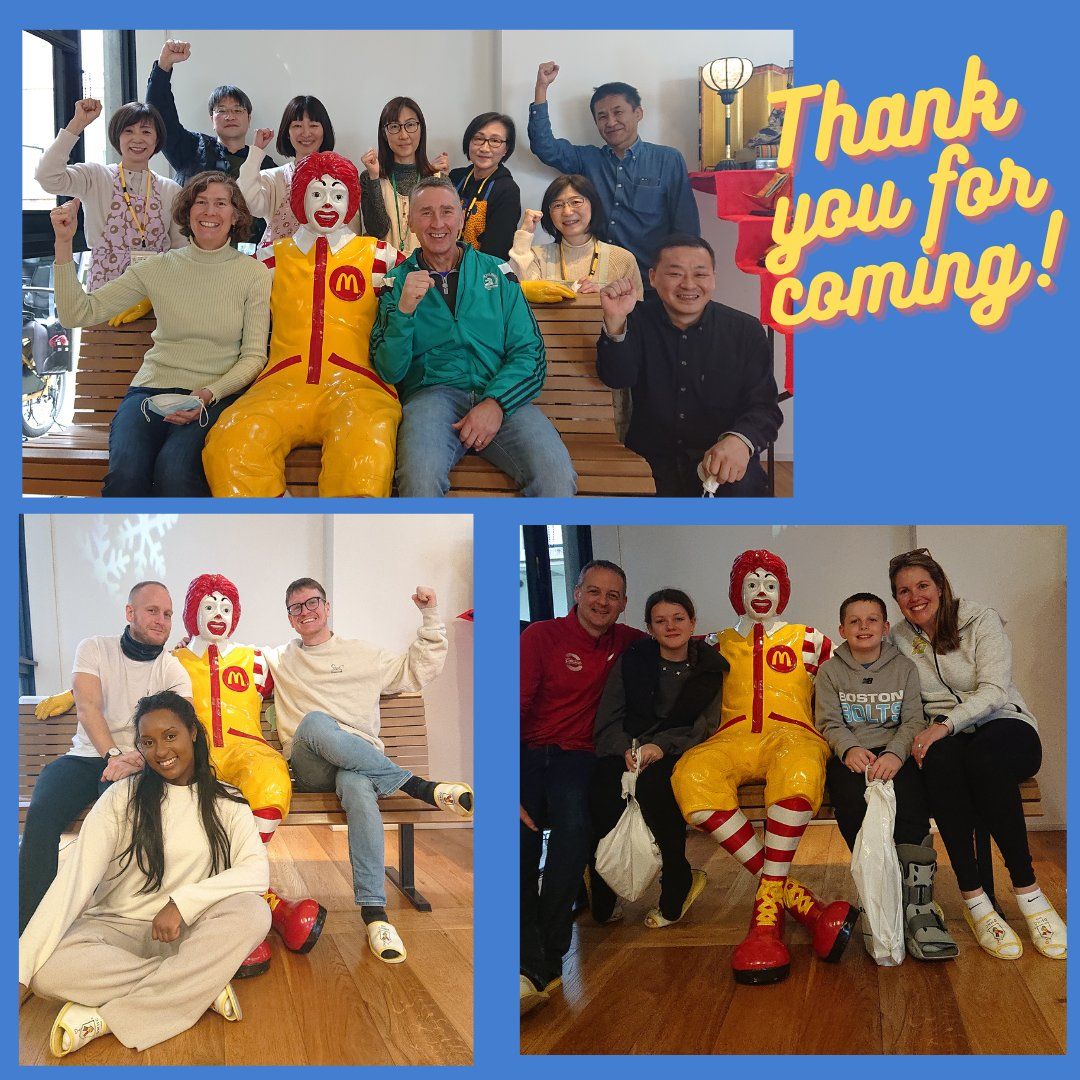
The Journey
I think if I hadn't had the experience of the previous five majors (as well as the other marathons, ultras, and triathlons), Tokyo would have been a shit show.
For the whole race I had a constant ongoing internal monologue, and the content of that monologue was everything that I had learned about road racing (and myself) over the previous eight years.
The first major marathon that I was interested in doing was London. It wasn't because I wanted to do the six major marathons but rather because my brother had done it and I was jealous. I entered the ballot on multiple occasions but failed to get a place.
The first major marathon I actually did was Berlin. Whilst disappointed about another failed London ballot I applied for a joint ballot entry with Charles, my brother. We got in. Re-reading my race report for Berlin I note that it was never my intention to complete the majors:
"I explicitly intend not to do Chicago because running the 6 majors is my brothers thing - he re-motivated me to start running again, and I have no interest in running all 6 until he has." 26 year old me.
There were a lot of ups and downs along the way with both my running, and my life but it was always very important to me that he finish the majors first or we finish them together. It was for that reason that I made sure to get my vengeance on New York in 2023 such that we could finish together in Tokyo.
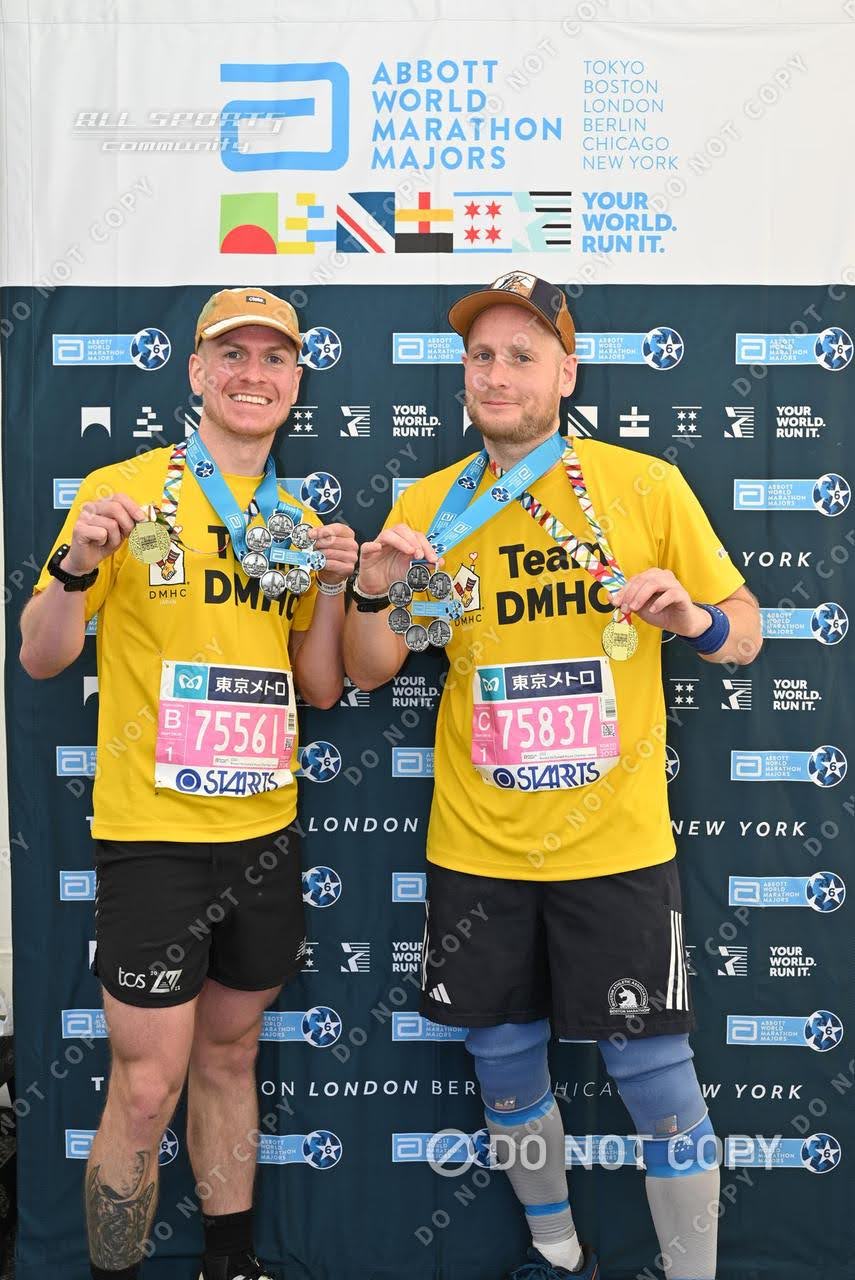
When talking to runners about the Boston qualifying criterion there is often a joke that the way to get in is either to get faster or to get older. In terms of my entry path to London my Berlin time guaranteed me entry. It also got me into Boston and New York. There was something particularly special about getting that classification of 'good for age' when noting the amount of effort that had gone into the training.
In 2018 I ran Boston. It was that year - the orange jacket year. 20mph headwinds and consistent brutal thunderstorms. The year that Cliff didn't publish their pre-race footage because it probably would have been an insurance liability. In my Boston race report I see how predictable my personality was, is, and probably always will be:
"I remember vividly letting my ego take a hold and thinking that I should post on Facebook about how I was going to nail Boston. I got my ego in check and its just as well.. I then got injured." Me, age 27.
I trained mainly in Vancouver, Canada with the famous Forerunners running club in Kitsiliano. This was my first insight into the community surrounding running - I made some incredible friends who pushed me hard, supported me, and had my back.
I got London done in 2019, Re-reading that post demonstrates that my 'go big or go home' no Plan B attitude to racing did not come until later. I had A, B, and C goals and I did in fact 'fail' to hit my A goal. I was never the biggest fan of London as a major which is ironic given that wanting to do it it got me into marathon running.
I was entered into Chicago for the following year (IIRC). Covid then happened and it wasn't until 2022 that I actually made it to Chicago. I was running Chicago off the back of the Comrades down run and I was very not OK physically. I got the job done.. just (2:59:56).
Chicago was the biggest lesson for me. I firmly believe in the idea of 'self story' - the idea your past, experiences, and attitudes teach you who you are. Chris Eubank states:
"It’s hugely important because it teaches you to believe that no matter how hard things get, you are the type of person that will find a way".
The eight years it took me to complete the majors just so happen to line up with the timeline of my own generalised career progression and I firmly believe my relative success in both areas was solely premised on my self story that I am the kind of person that will do what I say I will do. Failure in Chicago loomed on the horizon and I was too proud (and cheap) to walk away. I realised that if I 'failed' it would destroy my identity. Again, 'do it properly or not at all'. Others were caught in the shrapnel of my battle with myself and I am only not regretful because I learned something from it - these experiences made me who I am today. That report also noted that "I still think that I'm a 2:4x marathon runner on my day, and at some point I'm sure I'll put in the effort again to go for gold.". Having had my day, looking back on the journey is incredibly fulfilling.
Getting better
Tiger Woods (pretty decent golfer) once said that "Winning is not always the barometer of getting better". When I reflect on the majors two will always stand out - Boston in 2018, and New York City in 2023.
Boston always stands out because it is Boston, and it was that year.
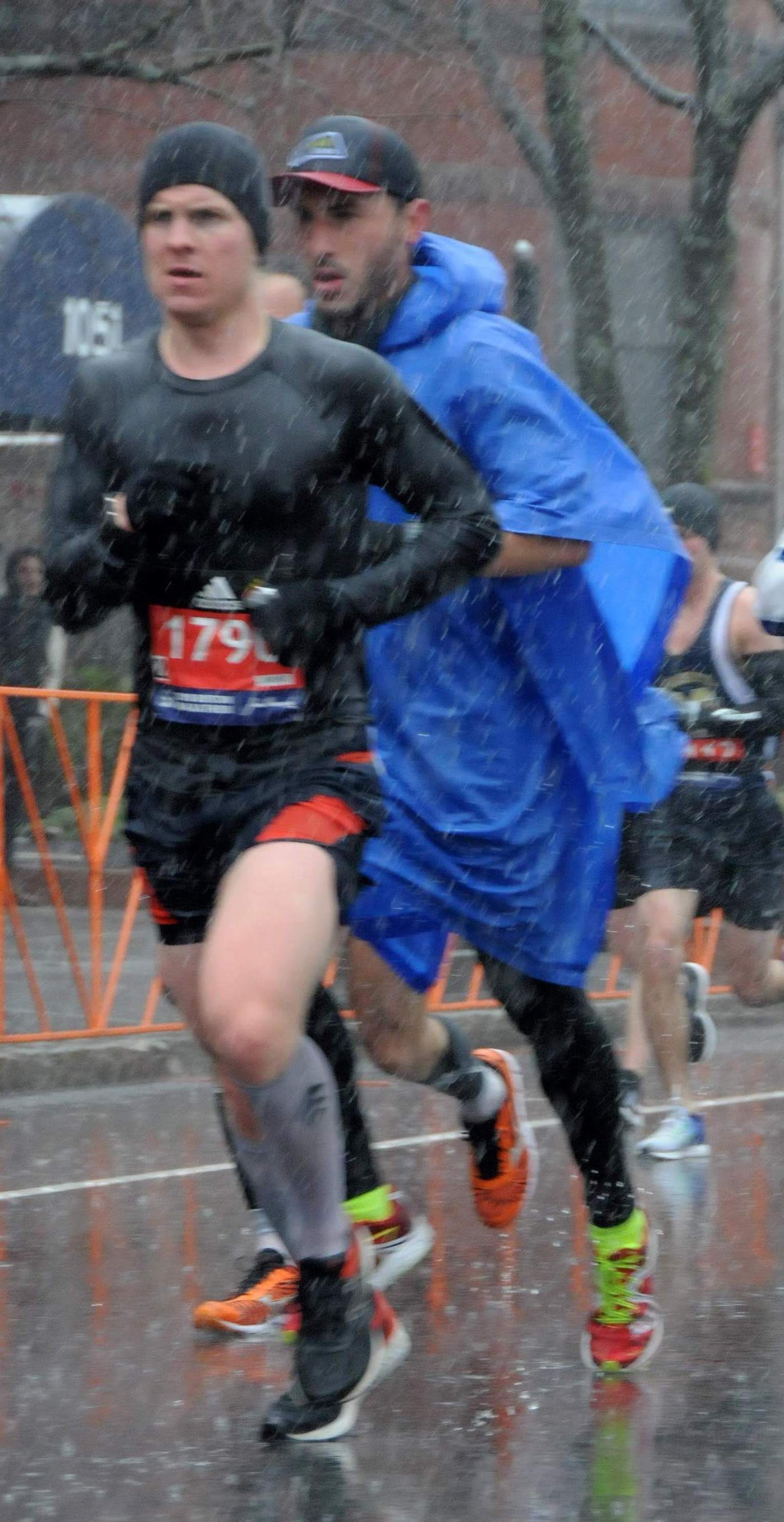
New York was the most memorable to me because whilst it wasn't my fastest marathon time (although it was my fastest major), it was just such a meaningful experience for me.
In 2017 I ran the New York Marathon having qualified at Berlin (in 2016). Unfortunately I had completely nailed myself into the ground training for Berlin. I had destroyed myself physically and mentally as well as in the process developing a binge eating disorder which proceeded to take over my life. I ballooned in weight, and stopped training. I vividly remember (and I have a terrible memory) being in Busan, South Korea on a run with a friend and breaking down realising how far I had fallen. Being able to come back to the biggest marathon on the planet and do it properly after the disappointment of 2017 was, is, and always will be one of my greatest memories.
This, I suspect, will always be one of my favourite photos..
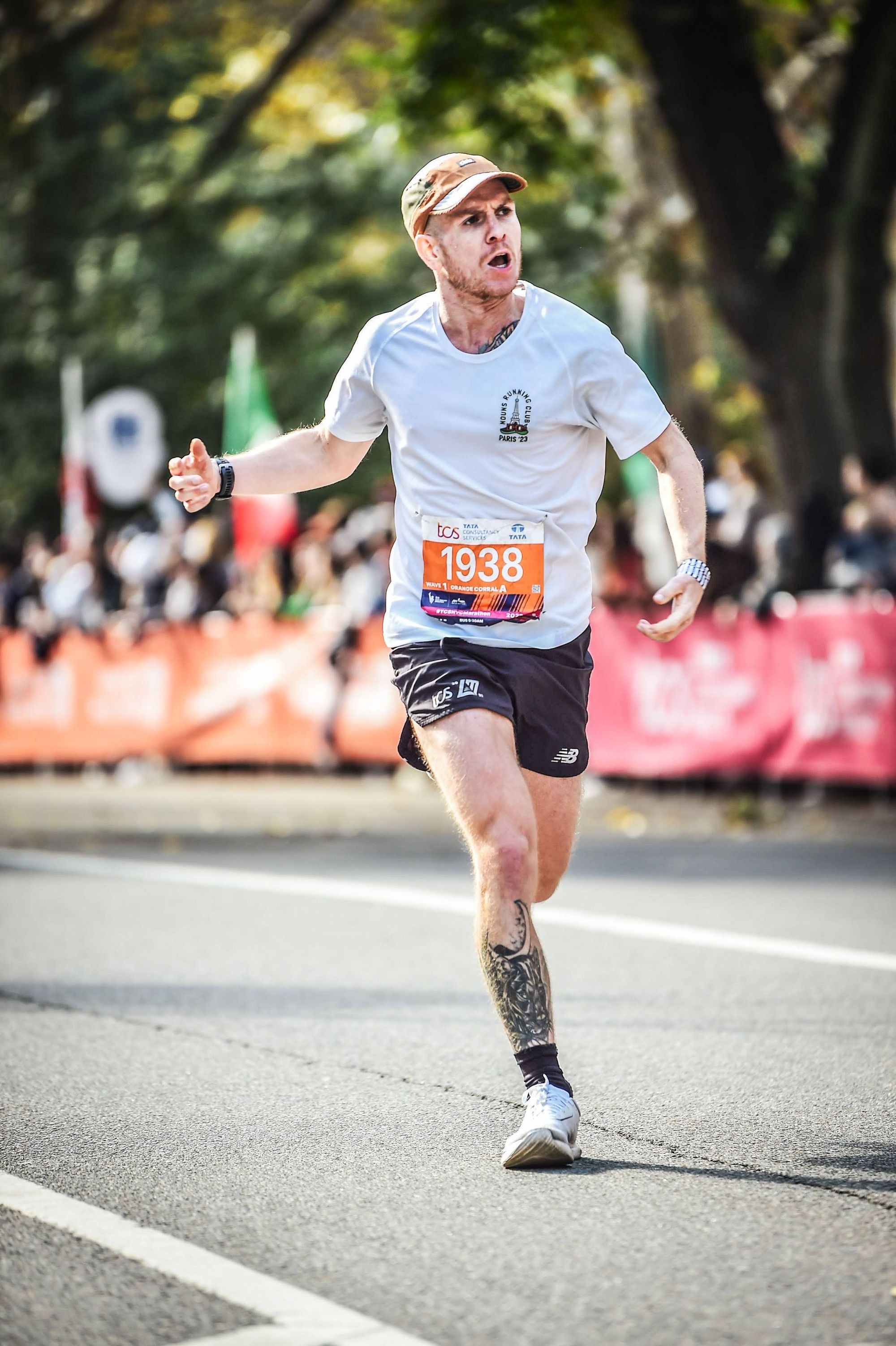
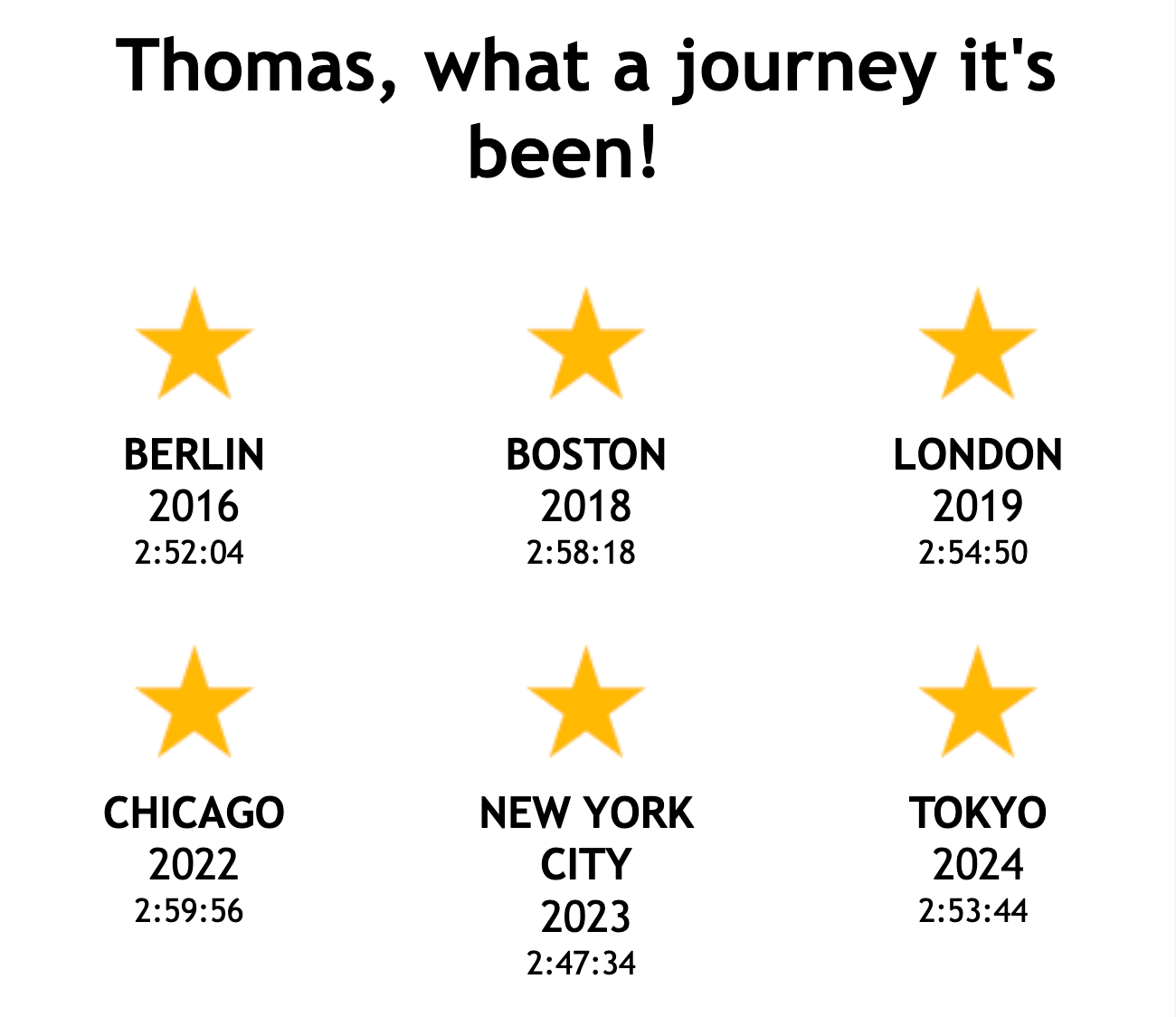
Next
In the lead up to Tokyo I got an email from NYRR (the organisers of the NYC marathon) stating that I could now claim my guaranteed entry to the 2024 edition of the race. My performance in 2023 guaranteed me entry into a race that is harder than Harvard to get into. My instant reaction was YES ! It is so hard to get into these races and I have historically worked so hard to do so. Now I am being invited back. I thought about it a bit more post Tokyo and I realised that I did not want to go back..
For the same reason I would never go back to Boston, I would also not run the NYC marathon again - it is a core memory of mine and I would not ever want to risk tarnishing such important memories.
Derek Sivers famously said:
"If you’re not feeling “Hell yeah, that would be awesome!” about something, say no."
It got be thinking more widely about where I go from here and I realised that completing the majors is an apt and appropriate point at which to end my marathoning journey. I have achieved more than I ever thought I could on the roads and simply put I don't want to do more.
When I read through my own race reports I notice a consistent through line - it's always mentally tough, my business output decreases, I always have an injury (or whinge-ury) that I am complaining about, and usually it all goes fine.
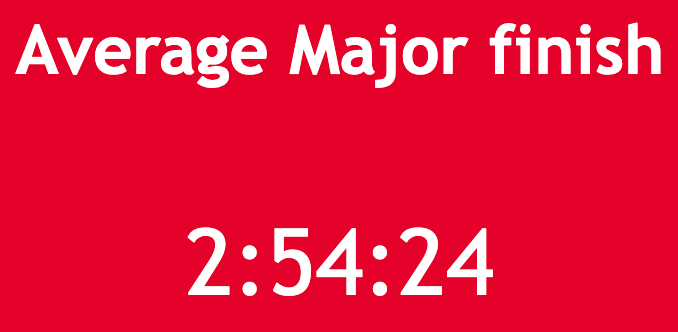
This graphic suggests that I am a fairly decent marathon runner, but it also demonstrates that I am full of shit. I appreciate that having goals is important, and I also appreciate that failure is disappointing yet through the process of completing the majors I have.. ironically.. realised that marathon running is not for me. Realistically my majors journey was me trying to prove something to myself, and I did that. Perversely it feels very easy walking away.
Marathon running honed my ability to stare into the abyss it taught me to think "reasonably about things that are uncomfortable to contemplate", and acknowledge the things that previously I was extremely wrong about.
My intention is to enter my 'trail, bike, swim non-competitive era'. But first..
Two Oceans.
For some reason people semi-regularly seem to refer to me as that ultrarunning guy (or equivalent). In reality I have run one ultramarathon, twice - Comrades.
Comrades' sister race Two Oceans has always been on my radar - After getting my Comrades' silver medal in 2022, I always wanted to get the harder silver at Two Oceans - 35 miles in sub 4. Even when my training was going incredibly well this was always going to be a tough ask, but having now basically taken 5 weeks off, the fitness just isn't there. The knee still hurts, and realistically pushing myself would be reckless.
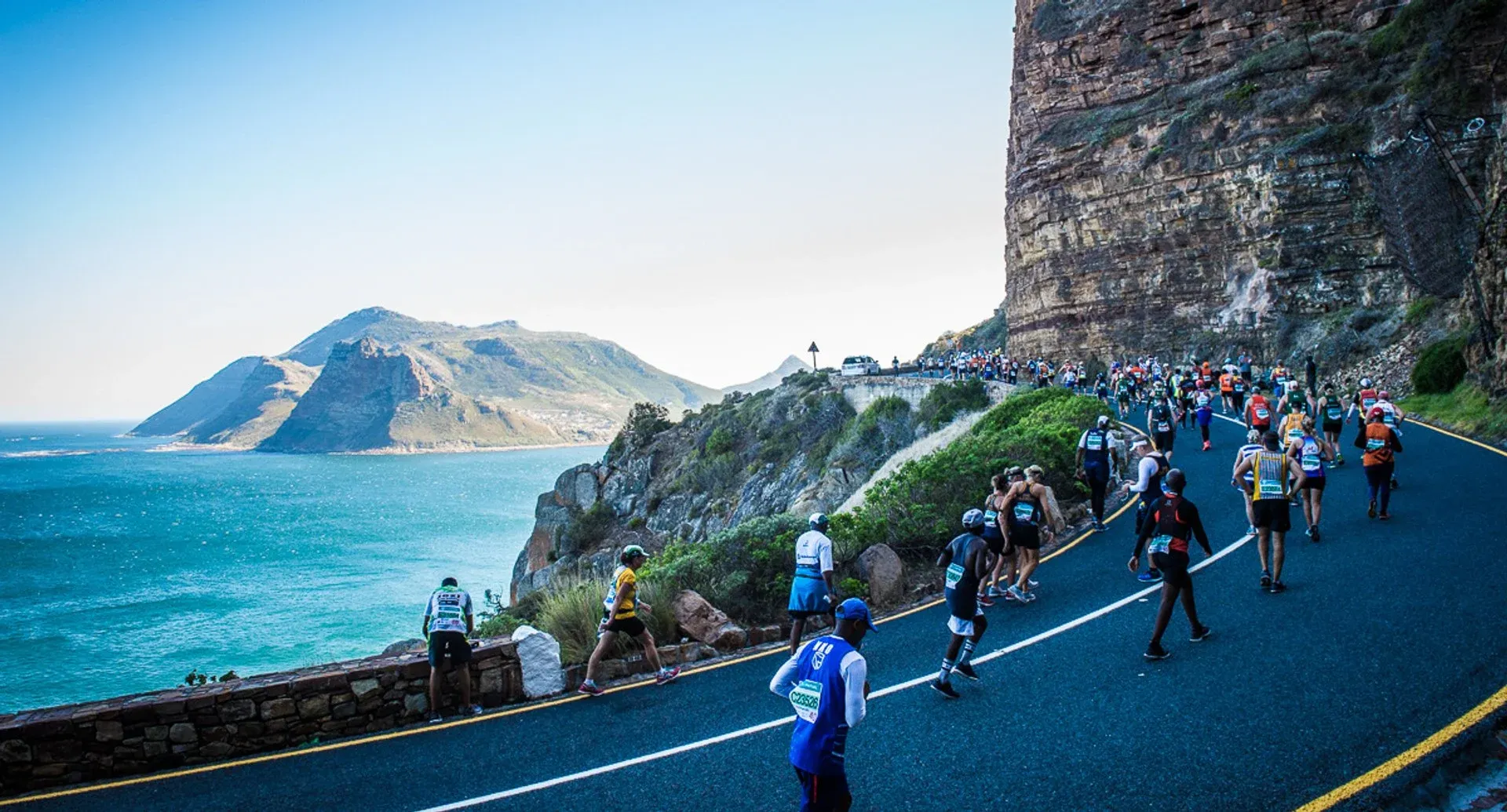
I have however been able to reframe the race in a manner that 8 years ago I would not have been able to. The race is sold as the world's most beautiful marathon, and when visiting Cape Town post Comrades in 2022 I was able to see why. Whilst driving up Chapmans Peak I was mesmerised and knew that I had to come back to experience the race first hand.
Two Oceans was originally the A race, and Tokyo was a stepping stone. I had all sorts of fun ideas about how I could approach Tokyo, and the one that stuck out was running without a watch. I was confident when my training was going well that sub 3 would be a formality and I wanted to see what would happen if I didn't have access to every timing/health metric physically possible on a small circular display on my wrist. When Tokyo came around I needed a watch, for Two Oceans I do not - what better way to take time pressure off the table than to.. remove the time.
It would be super awesome to walk away from competitive road racing having nailed that dream race but theres something almost poetic about everything in the journey to Two Oceans going wrong - this was not how this was meant to go down. But such is life - I have had it good for a long time, and a big set back was long overdue. I am not naive, nor am I oblivious to my insane privilege in even being able to visit these incredible places and run these races. In Tokyo I got the result I wanted, but did not deserve - I will always be endlessly grateful for that success. Chasing the Marathon Majors turned out to be the most life changing experience for me. Now I am happy to just enjoy Two Oceans and walk away. What a wild ride.
